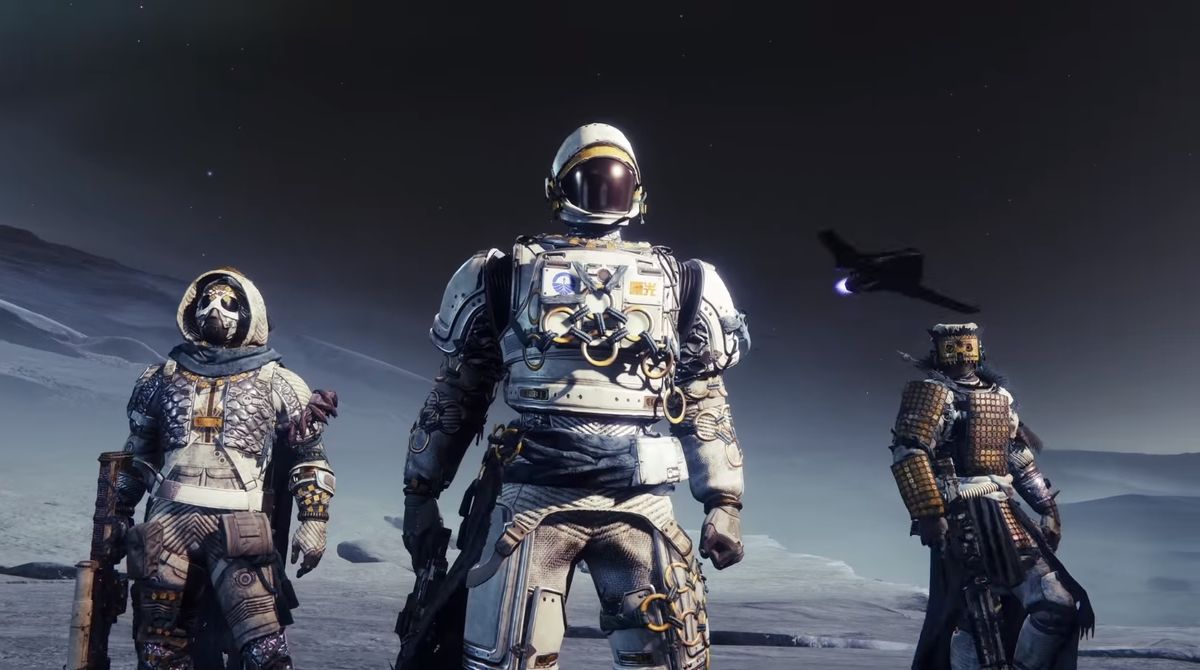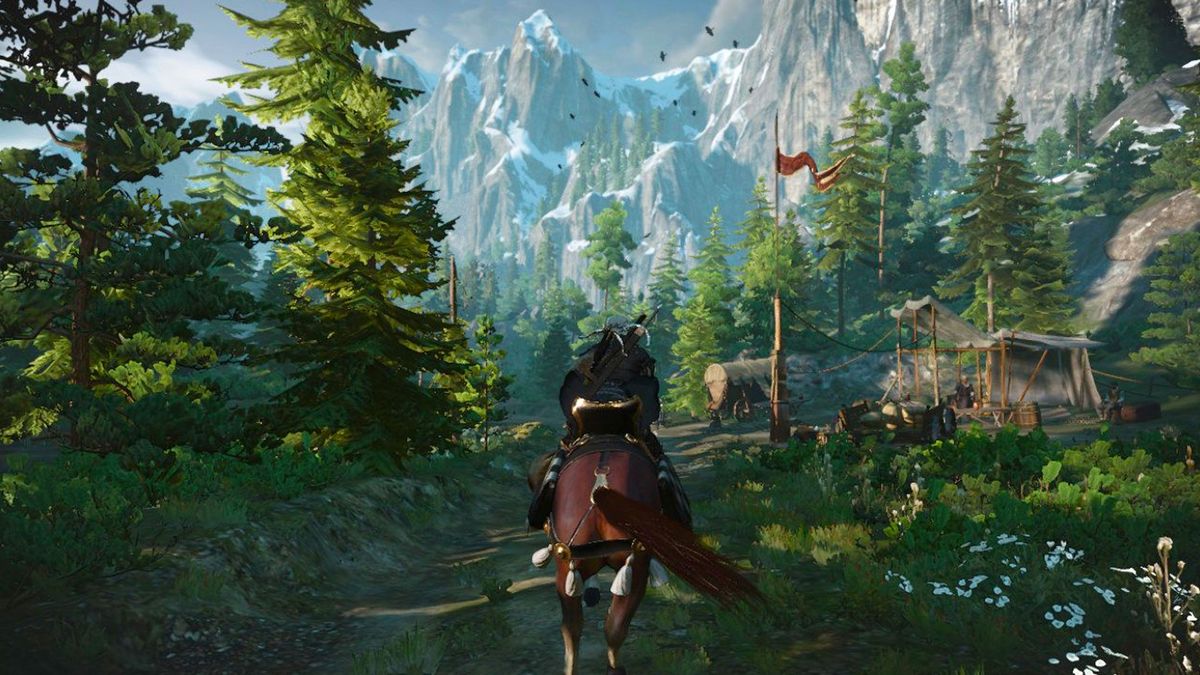There are no other games on Xbox that offer as much intoxicating freedom or are quite so amazingly big as Elite: Dangerous. Having started life as a PC game, it’s remarkable how well this has made the transition to console. Its galaxy is a dizzyingly huge, scientifically accurate replica of our own, with over 400 billion systems. You’ll never see them all, but luckily most of the action takes place in a relatively small corner of it. It’s a beautiful cosmic sea of burning suns, hulking gas giants, ethereal ring-worlds, and dense asteroid belts.
Frontier has captured the humbling, unknowable majesty of space brilliantly, and the scale of it all is overwhelming. And the game has made the move to Xbox One without any graphical compromise. It looks every bit as good as it does on PC, albeit with some frame drops when entering crowded areas.

How you spend your time here is entirely up to you. It’s player freedom that defines Elite: Dangerous, and this is one of the purest expressions of a sandbox game. There’s no hand-holding whatsoever. You start the game with a basic ship and a thousand credits in some unremarkable backwater station, then the reins are handed to you.
It’s an exhilarating moment, gazing across that twinkling starscape, knowing every point of light is a system you can visit. But this freedom can also be paralysing, because you constantly have to set your own objectives as you play. If you aren’t feeling inspired, that endless blackness can feel unfathomably, impossibly big.

Crossplay

The Xbox One version of Elite: Dangerous takes place in the same universe as the PC/Mac one. Players will never meet face to face, but share the same economy and galactic power structure. So if Xbox One players manage to shift the power of a particular system, PC and Mac players will feel the effects – and vice versa. Hopefully future updates will allow both sets of players to fight, or cooperate, with each other more directly. I’d love to be able to form a wing with a friend playing on their computer.
Deciding how you’re going to make your mark on the galaxy also extends to your choice of ship. There are around twenty to choose from, and they all have their own distinct personalities, uses, strengths, and weaknesses. Your first ship, the Sidewinder, is a reliable all-rounder, but you’ll want to upgrade as soon as you have the money. Credits are everything in Elite: Dangerous, and you’ll want to earn as many of them as possible, as quickly as possible.
Ships range from nimble, combat-geared fighters like the Eagle to the Hauler, a chunky space-van that’s not much good in a fight, but has a large cargo hold. There are fearsome battleships like the Anaconda and luxury yachts like the Orca. Long-range explorers like the Asp and high-end military ships like the Imperial Clipper. All of them have unique interiors, sounds, and handling models, and they’re a joy to fly, thanks to a responsive, precise flight simulation.
Combat in Elite: Dangerous is like being in the thick of a Star Wars space battle. Dogfights are tense, exciting wars of attrition as you circle your opponent, pecking away at their shields, before pummeling their exposed hull until they explode in a ball of fire. Succeeding in combat is all about positioning, power management, and predicting the enemy’s movement. From one-on-one duels to giant space battles around capital ships, combat is always thrilling.

Your ship has a lot of functions – from starting your engines to lowering your landing gear – but everything is cleverly, intuitively mapped to the Xbox One controller. Power can be routed between different systems to give you an edge. Boost your system power and your shields will regenerate faster; dedicate all your power to your weapons and you can fire for longer without them overheating; or send everything to your engines to increase your top speed.
This sounds complicated, but it’s really just a matter of tapping the D-pad to distribute resources around the ship. Multi-button inputs deal with the problem of there being fewer buttons on a controller than a keyboard. Holding down on the D-pad and pressing X lowers your landing gear, for example.

Combat could be a simple matter of defending yourself from pirates; or maybe you’re the one doing the pirating. Or it could be something altogether grander. You can swear your allegiance to a faction in Elite and fight in an ongoing territory war. Systems are constantly won and lost, and if your side is victorious, the rewards include credits, new ships, and otherwise unobtainable weapons.
But it’s entirely possible to play and enjoy Elite: Dangerous without firing a single shot. There are other ways to make money. You could become a miner, harvesting asteroids for precious minerals. Or a courier, ferrying goods between systems. You can buy resources at one station, then sell them to another that’s in dire need of them for a massively inflated price. Well-designed menus make trading, picking up missions, upgrading your ship, and selling exploration data with the controller easy.

Or you can be an explorer, which is how I spend most of my time. As you travel the galaxy, you can scan undiscovered planets and stars and sell the data back at stations. And with 400 billion systems, there’s plenty to go around. If you’re the first player to discover something, it’ll be tagged with your name. But if someone’s been there before, you’ll still earn credits anyway. If you want to see some of the galaxy’s most stunning sights, and get paid for it, this is a great career to pursue.
You’ll need patience, though, because travel in Elite can be excruciatingly slow – even though you’re moving at many times the speed of light. You’ll spend a lot of time in supercruise mode, travelling between stations, which is long, drawn-out, and uneventful. You occasionally have to adjust your speed so you don’t overshoot your target, and sometimes pirates will yank you out of it, but mostly you just sit and wait for the tiny dot in the distance to get larger.

Because of this, it’s not a game you can dive into for a quick session. To get anything done, you’ll need at least a couple of hours, making it a real time-sink. You can lose entire evenings to supercruising. The distances between planets might be realistic, and make for a convincing simulation, but it just isn’t much fun. If supercruise was just a little faster, it would make all the difference.
Since its initial release on PC, Elite: Dangerous has changed beyond recognition. Features like being able to form co-op wings with friends, the galactic conquest mode, and mining were added over time – and the Xbox One version will be the same. Future expansions will include being able to board other ships and explore the surfaces of planets. It’s a game that will constantly evolve over time.

The size can be overwhelming, and the often brutal lack of hand-holding won’t suit every kind of player, but seeing a game of this scope and ambition come to consoles – and so effortlessly – is fantastic. But be prepared for a much slower-paced game than you might be used to. You’ll need to invest a lot of time in Elite: Dangerous to see the best of what it has to offer. But once you’ve conquered that steep learning curve, you can start shaping your own destiny among the stars.
The Verdict
4
4 out of 5
Elite: Dangerous (Xbox One version)
Massive, intimidating, and stunningly beautiful, Elite: Dangerous is one of the deepest, most rewarding open-world experiences you can have on Xbox One.
 Game News Video Games Reviews & News
Game News Video Games Reviews & News



